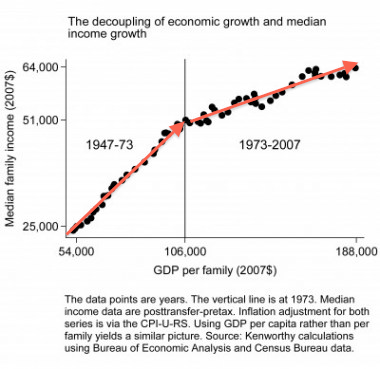Lane Kenworthy has provided the best response that I’ve yet seen to Tyler Cowen’s assertion that median family income growth has declined over recent decades because of a decline in innovation.
The great decoupling « Consider the Evidence.
Here’s the key graphic (red arrows mine):
Lane points out:
| 2007 $s | ’47-’73 | ’73-’07 |
| Annual Percentage Increase | ||
| GDP per family | 2.6% | 1.7% |
| Median family income | 2.7% | 0.7% |
| Absolute Increase | ||
| GDP per family | $52K | $82K |
| Median family income | $26K | $13K |
Median family income was $64,000 in 2007. Had it kept pace with GDP per family since the mid-1970s, it instead would have been around $90,000.
It’s not at all clear to me how a decline in innovation would result in these distributional changes. Doesn’t everything trickle down?

Comments
10 responses to “It’s Not the Innovation, It’s the Distribution. Lane Kenworthy on Tyler Cowen”
I sliced across it a little differently.
http://jazzbumpa.blogspot.com/2011/02/more-on-golden-age.html
But wait — there’s more!
http://jazzbumpa.blogspot.com/2011/02/real-disposible-income-per-capita.html
For you — no extra charge.
Cheers!
JzB
If there is decline in the economic value of the individual worker, then median income would decline. Faster innovation actually does a better job of explaining this, contrary to Cohen.
@Chris T
Cowen, not sure where I got Cohen from.
Perhaps it’s not an economic but a political phenomenon. Total income has grown, but most of it has gone to the top 1% or less of earners. If my memory served me better, I could cite the book I read recently which traced the many ways this has happened since the ’70s – changes in the tax code being uppermost in my mind. Hmm, vast increases in pay of top executives, massive bonuses to traders and such in the financial industry. When it comes to economics, I like to look at the reckless, ignorant, and covetous behavior of individuals as a major force.
The book is “Winner-Take-All Politics” by Jacob Hacker and Paul Pierson. The thesis is that, to quote the front flap, “Runaway inequality and the present economic crisis reflect what government has done to aid the rich and what it has not done to safeguard the interests of the middle class.”
Economics and Politics are that rare set of twins, where both are evil.
JzB
@ramster
‘zactly right, imo. That’s what I was certainly meaning to imply, without doing one of my usual rants…
@Chris T
Thinking more about this, Cowen’s thesis really makes no sense in light of this data. Declining innovation rates should increase the value of the worker in an expanding economy since there would be less opportunity to substitute with technology. The actual trend indicates the opposite: declining value to the economy.
Declining innovation is a second order effect. What makes the difference is politics and power: a choice to give increasing majorities of productivity growth (however defined) to corporations and thus to the rich, as well.
@Ian Welsh
Yeah. Tyler doesn’t explain how declining innovation could cause median income growth to stagnate (much) more than GDP growth.